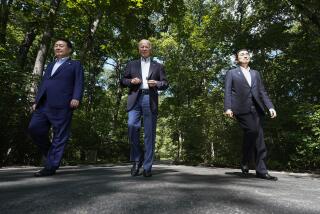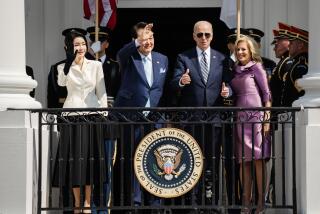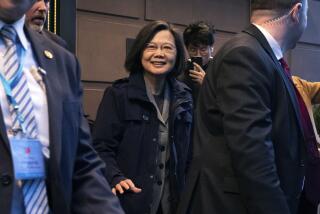Rice Enters Web of Tensions on Her First Trip to Asia
- Share via
BEIJING — On her arrival in Tokyo today, Secretary of State Condoleezza Rice will find herself in a region with dangerous flashpoints, hoping that none of them spins out of control.
North Korea’s nuclear weapons program is the most pressing concern and one that is expected to dominate Rice’s discussions in Tokyo, Seoul and Beijing over the next four days. The issue has gained more immediacy since the Feb. 10 declaration by the regime in Pyongyang, the North Korean capital, that it had nuclear weapons and would abandon talks aimed at quashing its nuclear ambitions.
North Korea stepped up its verbal attacks on Rice after she called the isolated state one of six “outposts of terror” in her confirmation hearings.
“She is no more than an official of the most tyrannical dictatorial state in the world,” a spokesman for North Korea’s Foreign Ministry retorted, according to the country’s official KCNA news agency. Rice, the spokesman added, is “bereft of any political logic,” reckless and someone Pyongyang can’t deal with.
A second concern is relations across the Taiwan Strait that have become increasingly strained since China’s passage Monday of a controversial anti-secession law, which gives Beijing a legal framework to use “non-peaceful means” if Taiwan declares independence. Also threatening the tense relations between the two adversaries, separated in a 1949 civil war, is the expected lifting in June of a European ban on selling weapons to the mainland and Taiwan’s proposed purchase this year of $15 billion in U.S. weapons.
A third concern is the growing tension between Japan and China. Tokyo’s military profile in the region has recently expanded. After years of ambiguity, Japan announced last month that Taiwan was among its security concerns. This has raised hackles in China, which considers its dispute with Taipei a purely domestic issue.
“We don’t like Japan’s frequent actions around the Sea of Japan recently,” said Liu Guoshen, Taiwan research director at Xiamen University in the southeastern province of Fujian. “We’d never allow Japan to dip its finger into the Taiwan issue.”
Tokyo also angered South Korea at the start of what is billed as 2005 Japan-Korea Friendship Year, when a local legislature reasserted the nation’s claim over a cluster of rocky islets now administered by South Korea. The islands, known as Takeshima by the Japanese and Dokdo by the Koreans, are uninhabited but surrounded by rich fishing grounds.
“These issues leave a lot of room for miscalculations,” Lo Chih-cheng, executive director of the Institute for National Policy Research in Taipei, said about the problems facing Rice.
North Korea’s announcement that it had nuclear weapons should have drawn together the other countries involved in the six-party talks -- the United States, China, Japan, South Korea and Russia. Instead, it has made long-standing rifts more glaringly apparent.
With the exception of Japan, the other parties have argued that the United States should be less strident in its dealings with North Korea. But in the past, when Colin L. Powell was secretary of State, differences were largely glossed over with diplomatic bonhomie. Rice’s more forceful style is exposing the rifts.
North Korea has demanded an apology for Rice’s “outpost of terror” comment as a precondition for resuming talks. But she has refused, insisting that she was telling the truth.
“I am not going to get into a debate on semantics with the North Koreans,” Rice told ABC News on Thursday. “The North Koreans are determined to change the subject from what North Korea is doing, and we are not going to let them change the subject.”
Her rejection of one-on-one negotiations between the U.S. and North Korea, a mainstay of the administration’s policy, also has led to calls for greater U.S. flexibility, particularly from leaders in Seoul, the South Korean capital.
“We in South Korea believe that the U.S. policy has failed. If they are really serious about nonproliferation, they have to stop the existing policy and explore other ways,” said Paik Hak Soon, head of North Korean studies at the Sejong Institute, a South Korean think tank.
He said it was still not clear what the U.S. wanted: denuclearization of the Korean peninsula or regime change in Pyongyang. Although Washington would like to heap more pressure on North Korea, neither China nor South Korea wants to see the regime collapse. Beijing has resisted calls to squeeze its impoverished neighbor, perhaps by blocking trade and energy supplies.
Nor has Seoul slowed the pace of economic cooperation projects with the North since Pyongyang’s Feb. 10 announcement. For the first time since the Koreas were divided, the South on Wednesday sent electricity across the border to supply a joint industrial park in the North Korean city of Kaesong. There was little fanfare to mark the historic occasion in an effort to avoid criticism from the United States.
Beijing released one of its highest-profile political prisoners Thursday, days before Rice’s scheduled Sunday arrival. In an apparent return gesture, Washington agreed not to seek a United Nations censure of China’s human rights record.
The released prisoner, Rebiya Kadeer from China’s far western province of Xinjiang, was sentenced in March 2000 to eight years in prison for “illegally providing state intelligence abroad” after she sent newspaper clippings to her husband in the United States. On Thursday, she boarded a plane for the U.S., according to the San Francisco-based Dui Hua Foundation.
Although Rice’s primary concern on her stop in Beijing is likely to be a discussion of how to bring North Korea back to the bargaining table, she also is expected to question China about its military buildup.
On March 4, China announced a $30-billion defense budget for the coming year, a 12.6% increase and the latest in a series of sizable hikes. The CIA recently said that Beijing’s military expansion was tilting the balance of power in the Taiwan Strait and increasing the threat to U.S. forces in the region.
China would like to buy more weapons from Europe. And many European states would like to sell them. To do so, however, the European Union needs to drop its ban on weapons sales to Beijing, enacted after the 1989 Tiananmen Square crackdown. Washington, however, opposes lifting the sanction.
China’s aggressive spending has not only made Taipei nervous, it also has alarmed Japan.
“China might say it will rise peacefully,” said Takashi Inoguchi, a professor at Tokyo University. “But how do we know? Japan has felt the need to assert itself more in response.”
Japan’s concerns have been sharpened by Beijing’s apparent efforts to probe its defenses, including the incursion late last year of a nuclear submarine into Japanese waters.
Rice’s first trip to Asia since becoming secretary of State is not expected to produce any major breakthroughs, and a big part of the meetings will be relationship building.
“The U.S. is trying with this trip to improve relations with Asian countries,” said Zhu Xianlong, a foreign policy expert at Beijing Union University.
Analysts say they hope that Asia’s interlocking web of tensions remains under control, and that Rice isn’t called upon to rely on those relationships in a crisis.
“These tensions need to die down fast,” Inoguchi said. “The governments all want to be closer and see smoother relations. Unfortunately things like nationalism can get out of control. It doesn’t always work out that way.”
*
Yin Lijin in The Times’ Beijing Bureau contributed to this report.
More to Read
Sign up for Essential California
The most important California stories and recommendations in your inbox every morning.
You may occasionally receive promotional content from the Los Angeles Times.










